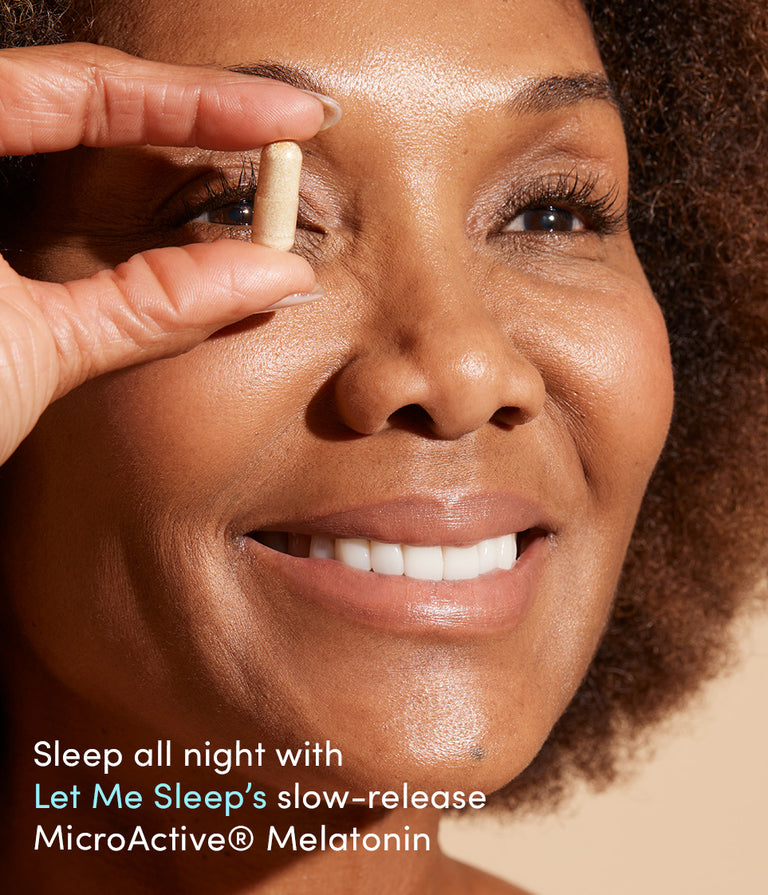By Julia Walker, RN, BSN 5-Minute Read

Julia Walker, RN, BSN is a women's health nurse, writer, and member of the perry team. Perry connects and supports perimenopause warriors in a safe space—to build friendships, learn, and laugh. The moment you think "WTF, could this be menopause?"—join our sisterhood!
Sleep evades many women in perimenopause and menopause. Between natural shifts in the circadian rhythm, hormonal changes, anxiety, night sweats, and the ever-present, everyday stressors of middle age, it's no wonder sleep troubles are one of the top complaints of women in this life stage. And while there are many different routes you can go to help improve your nightly rest, there is one addition that most women can safely take that will better their sleep—and health—overall: magnesium. Here is everything you need to know (and probably more) about using magnesium for sleep.
What is Magnesium?
We've all heard of it, but few of us know that this mineral high up on the periodic table is one of the most abundant in the human body. (Indeed, it is one of the most common on the earth!) Magnesium is largely stored in our bones, but it plays a role in over 600 enzymatic reactions that help us function daily. What isn't stored in our bones is found in muscles, soft tissues, and other body fluids.
The benefits of magnesium extend to both our mental and physical wellbeing. From a cellular level, magnesium helps regulate gene expression, produce energy, and form proteins. It also plays a crucial role in communication between our neurons.
From a more global perspective of the body, magnesium helps:
-
Muscle movement
-
Regulate the sleep/wake cycles
-
Lower blood pressure
-
Regulate heart rhythm and rate
-
Reduce inflammation
-
Improve migraines
-
Better PMS symptoms
Magnesium and Your Menstrual Cycle
Intriguingly, research shows it can also help fight off premenstrual syndrome. In a 2010 study, women with PMS who suffered from symptoms ranging from moodiness and depression to physical ailments like breast pain reported their symptoms improved after taking a combination of magnesium and vitamin B6. This study, among others, suggests that premenstrual symptoms may be partly due to low magnesium levels. And, believe it or not, the same physiological mechanisms which cause PMS in premenopausal women can also affect women in perimenopause and, regrettably, become even more pronounced.
"Research shows low magnesium negatively impacts your ability to sleep."
Magnesium and Sleep
So, how does sleep come into play? Well, research shows that low magnesium negatively impacts your ability to sleep. Even slightly low levels of magnesium can cause sleeplessness and insomnia. Furthermore, depression and anxiety can also increase in the presence of lower magnesium levels, which can further interrupt your sleep.
According to the Sleep Foundation, a study on older adults found that by taking 500 mg of magnesium per day, participants:
-
Fell asleep faster
-
Slept longer
-
Slept more when they were in bed
-
Were less restless, and
-
Woke up later
Some tests were also run to show their melatonin levels increased (melatonin is a sleep hormone) while their cortisol levels decreased.
As we've touched on, women in perimenopause and menopause suffer from poor sleep quality. So, boosting your magnesium levels may be the key to reversing some sleep troubles. With that said, taking magnesium a few nights in a row probably won't cut it. You will want to consistently take it over the course of a few weeks to build up your magnesium stores before making the final assessment of whether it works for you or not.
What is the best way to get magnesium?
Magnesium is highly prevalent in many foods—so a smart way to increase your magnesium intake is to eat foods rich in the mineral, such as:
-
Avocados
-
Leafy greens
-
Bananas
-
Nuts and seeds
-
Legumes
-
Whole grains
-
Some types of fatty fish
Yet, boosting your intake of these food items may not be enough to help better your sleep. Therefore, it can help to take a magnesium supplement. Many women in perimenopause take plain magnesium supplements, such as magnesium glycinate, to help with sleep. Usually, most women can safely add a magnesium supplement to their health regime. Still, it's important to note that some forms of magnesium can cause diarrhea (because, low and behold, this mineral also helps relieve constipation!). If you want to be sure magnesium is safe for you to try for sleep, double-check with your doctor first, especially if you have other health conditions.
You may also want to consider a sleep supplement that has more than just magnesium. For example, supplements with a combination of magnesium and melatonin may help improve your rest even more. Unfortunately, studies show that melatonin decreases around menopause and is even lower in postmenopausal women. Thus, increasing the availability of this pineal hormone can be useful for regulating sleep in menopause and beyond.
"Supplements with a combination of magnesium and melatonin may help improve your rest even more."
Let Me Sleep from Womaness
If sleep is evading you, you may benefit from trying the Let Me Sleep supplement from Womaness. Designed to help women in perimenopause and menopause get a better night's rest, the Let Me Sleep supplement is mindfully formulated with researched-backed ingredients, including:
-
A highly bioactive form of magnesium sourced from seawater
-
Sustained-release melatonin
-
GABA, and
-
Chamomile extract
Sleep is an essential process our bodies need to repair, restore, and rejuvenate. If you struggle to get a good night's rest or battle fatigue all day, it's best to consult your doctor to see what options are available. Be sure to do your research ahead of time, so you can specifically ask about specific treatment options, including magnesium.
More Health & Wellness
Sleeplessness in Menopause: What to Know
What's Happening Here? Sleep Issues & Insomnia
What Should I Eat During Menopause?




